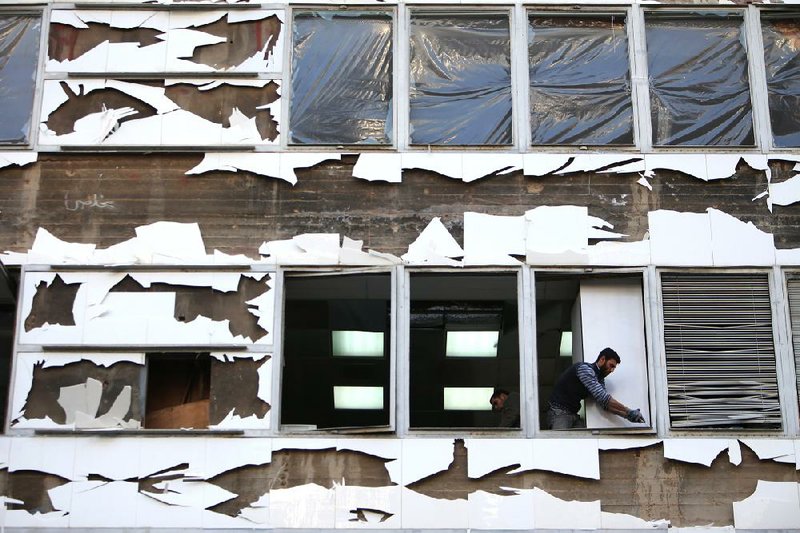BEIRUT - A powerful bomb shook central Beirut on Friday, killing at least six people and injuring dozens more, officials said.
Among the dead was Mohammed Chatah, a former Lebanese finance minister and ambassador to the United States who was a vocal critic of the government in neighboring Syria and its ally, the Lebanese militia Hezbollah.
It was not immediately clear whether Chatah was the intended target of the bomb. No one has claimed responsibility for the attack, which was reminiscent of a string of unsolved bombings that have targeted anti-Syrian politicians over the past decade.
Chatah was a prominent member of the Future bloc, the mainly Sunni party led by Saad Hariri, son of former Prime Minister Rafik Hariri, whose death in a 2005 bombing in Beirut sparked the protest movement that helped end Syria’s 29-year military presence in Lebanon. Nohad al-Mashnouq, a member of Parliament in the Future bloc and a friend of Chatah’s, confirmed that Chatah had been killed.
The attack deepened the sense of instability in Lebanon, which is sharply divided over the war in neighboring Syria, with the Future bloc and its allies backing the opponents of President Bashar Assad and Hezbollah supporting him. Lebanon has been without a functioning government for months because of a related political impasse. Several car bombs have exploded in the southern suburbs, where Hezbollah has many supporters, with Syrian insurgents or allied Lebanese militants being widely blamed for the attacks.
But Friday’s bombing was the first to tear through Beirut’s renovated downtown since Rafik Hariri’s death.
“This is a time when this plaza would be crowded, full of hope and colors, and now it’s black with this criminal act,” said Elie Ward, manager of the nearby Sultan Ibrahim restaurant. “But Beirut is sending a message to all the world that she will stay alive.”
Saad Hariri issued a statement implying that Hezbollah, Lebanon’s most powerful political party, was to blame, and noting that the international tribunal that has indicted members of Hezbollah in his father’s killing is to hold its opening sessions in The Hague in early January.
The statement said the attack was part of “a series of crimes and bombings aimed at sabotaging the country, a sinful attempt to target stability and hit national unity, which only benefits the enemies of Lebanon.”
Chatah, in a Twitter message Friday morning shortly before he was killed, was critical of Hezbollah, saying it sought to exercise the same power in Lebanon that it did during the 15 years Syria occupied the country after the end of its civil war.
Minutes after the blast, cars were aflame along a plaza in front of the Starco building complex, a downtown site notable for having survived unscathed through the civil war from 1975-1990 that gutted much of the surrounding area.
The explosion was a few blocks from the waterfront site where Rafik Hariri was killed, the last bombing to hit the downtown area.
Security has been heightened in recent weeks downtown, with soldiers standing guard at important intersections in armored vehicles. Jihadist groups fighting alongside the Syrian rebels, including Lebanese militants, have threatened to increase attacks in Lebanon over Hezbollah’s intervention on the side of the Syrian government.
In Syria, government forces ambushed members of an al-Qaida-linked group Friday, killing dozens of them near a historic Christian village north of Damascus, activists and state media said.
State TV said troops surprised fighters of the Jabhat al-Nusra, or Nusra Front, at dawn near Maaloula, which the group along with other rebels captured in late November for the second time this year.
The Britain-based Syrian Observatory for Human Rights said that dozens of opposition fighters were killed and that 20 were wounded.
In the northern city of Aleppo, Syria’s largest, mortar rounds struck the government-held neighborhood of Jamaliyah and killed at least four people, the state news agency SANA and the Observatory said. SANA said 14 people were wounded in the attack, while the Observatory put the number at 15.
Meanwhile, Mikhail Ulyanov, the head of the Russian Foreign Ministry’s disarmament department, said the Tuesday deadline for removing the most toxic of Syria’s chemical weapons won’t be met.
According to a timeline agreed upon earlier, the most toxic chemicals were to have been removed by the end of the year. But Ahmet Uzumcu, head of the Organization for the Prevention of Chemical Weapons, had earlier indicated delays were possible because of heavy fighting.
Ulyanov said it was unclear when the work might begin and that it probably wouldn’t be announced in advance because of concerns about possible rebel interference.
Information for this article was contributed by Anne Barnard, Dan Bilefsky, Hwaida Saad and Mohammad Ghannam of The New York Times and by Albert Aji, Bassem Mroue and staff members of The Associated Press.
Front Section, Pages 6 on 12/28/2013

